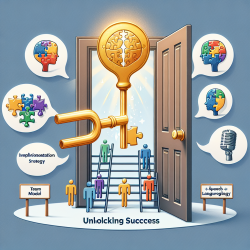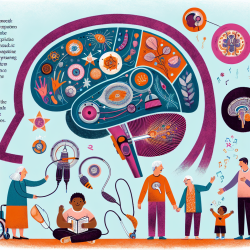Introduction
In the field of speech-language pathology, particularly when working with children with Autism Spectrum Disorder (ASD), the need for effective, evidence-based interventions is paramount. However, the challenge lies not just in developing these interventions but in implementing them effectively across various service systems. The recent study titled "Effectiveness of a Multi-Level Implementation Strategy for ASD Interventions: Study Protocol for Two Linked Cluster Randomized Trials" provides valuable insights into addressing this challenge.
Understanding the TEAMS Model
The Translating Evidence-based Interventions (EBI) for ASD: Multi-Level Implementation Strategy (TEAMS) model is a comprehensive approach aimed at improving the implementation of ASD interventions. The model focuses on enhancing implementation leadership, organizational climate, and provider attitudes and motivation. These factors are crucial for achieving two key implementation outcomes: provider training completion and intervention fidelity, which ultimately lead to improved child outcomes.
Key Components of the TEAMS Model
- Implementation Leadership: The TEAMS Leadership Institute (TLI) module provides specific strategies to improve leadership behaviors that support EBI implementation. Effective leadership is linked to a positive implementation climate, which is essential for sustaining innovative practices.
- Provider Attitudes: The TEAMS Individualized Provider Strategies (TIPS) module employs motivational interviewing to enhance provider engagement and attitudes towards EBI training. Positive attitudes are crucial for high fidelity in implementing interventions.
Implications for Practitioners
For practitioners in the field, the TEAMS model offers a structured approach to overcoming common barriers in implementing ASD interventions. By focusing on leadership and provider engagement, practitioners can enhance the quality and fidelity of interventions, leading to better outcomes for children.
Practitioners are encouraged to explore the TEAMS model further and consider how these strategies can be integrated into their practice. Engaging in leadership training and motivational interviewing can significantly impact the effectiveness of ASD interventions.
Encouraging Further Research
While the TEAMS model provides a robust framework, continuous research is essential to refine and adapt these strategies for diverse settings. Practitioners are encouraged to contribute to this body of research by sharing their experiences and outcomes when implementing these strategies. Collaboration with researchers can lead to the development of even more effective implementation strategies.
Conclusion
The TEAMS model offers a promising approach to enhancing the implementation of ASD interventions. By focusing on leadership and provider engagement, practitioners can improve the fidelity and effectiveness of these interventions, ultimately leading to better outcomes for children with ASD.
To read the original research paper, please follow this link: Effectiveness of a multi-level implementation strategy for ASD interventions: study protocol for two linked cluster randomized trials.










